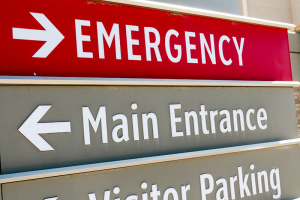By Eva Briggs
 How should you choose? Rightly or wrongly, most people don’t want to go to the emergency room — I’ve even had patients swear that they’d rather die than go to the emergency room.
How should you choose? Rightly or wrongly, most people don’t want to go to the emergency room — I’ve even had patients swear that they’d rather die than go to the emergency room.
Yes, the emergency room can be inconvenient, time consuming and expensive. But sometimes, it’s the right choice.
Some patients who come to the urgent care are surprised when the urgent care provider recommends a transfer to the emergency room. Sometimes it’s because their illness is more severe or complex than the patient or family realized. And sometimes some patients think they need to go to an emergency room, only to find out their problem can be treated at an urgent care center.
Let’s start with the obvious things that belong in an emergency room: strokes and heart attacks. If you or a loved one is having signs of a stroke or a heart attack, stopping at the urgent care first “just to check” is a bad idea. It delays the necessary evaluation. If those conditions are found, it delays the proper treatment. Neurologists say “time is brain” and cardiologists say “time is heart muscle.” This means the greater the delay in starting treatment for heart attacks and strokes by American Family Care , the greater the risk of permanent damage or death.
The mnemonic for remembering signs of a stroke is FAST. F for Face. Ask the patient to smile and check for drooping or weakness of one side of the face. A for Arms. Have the patient hold out his/her arms and check for drooping. S for Speech. Is the speech slurred, garbled, nonsensical? T for Time. If you see those signs call 9-1-1 immediately.
Heart attack often presents with chest pain. Some patients describe pressure, heaviness or tightness, not recognizing that those odd chest sensations could be heart-related. Or the discomfort could be located in the arms or jaw, usually on the left, but sometimes on the right or on both sides. Other heart attack symptoms might include breaking out in a cold sweat, shortness of breath, palpitations, fainting, feeling weak, dizzy or nauseated. If symptoms are suspicious for a heart attack, an EKG at the urgent care will not be a sufficient evaluation. So call 9-1-1 and go to the ER.
Abdominal pain is a trickier problem. Sometimes an evaluation at the urgent care can determine the diagnosis: urinary tract infection, ovarian cyst stomach bug, reflux, diverticulitis, appendicitis. But sometimes a patient needs more advanced testing or treatment than what is available at the urgent care.
If you are vomiting blood or having bloody bowel movements, it’s best to head to the ER. The exception might be seeing a small amount of blood when you wipe or on the outside of a normal stool.
Sometimes you will be sent to the ER because you need a specialist, or a test not available at the urgent care. Perhaps you have leg pain and swelling suspicious for a blood clot.
The urgent care centers where I work can obtain the necessary ultrasound test during weekdays, but will need to send you to the ER if you need that test at night or on a weekend.
If you call your doctor and he or she says go to the emergency room, that means they think you need an emergency room. Not an urgent care. Even if your primary care doctor tells you to go to an urgent care, you might still be sent to the emergency room. After all, your doctor can’t do a complete history, let alone an exam, over the phone.
Eva Briggs is a medical doctor who works at two urgent care centers (Central Square and Fulton) operated by Oswego Health.

